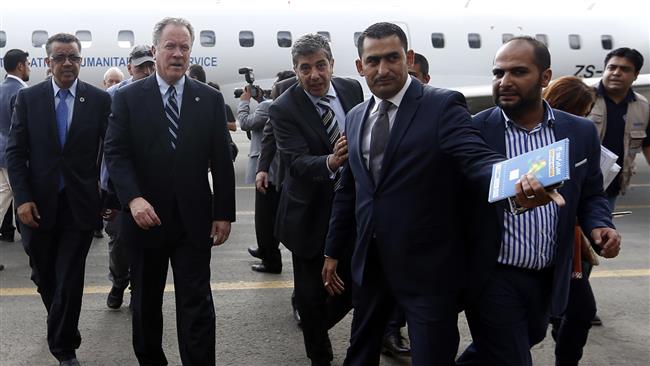Yemen grappling with ‘vicious’ combination of worst crises: UN
YemenExtra
The United Nations has warned that the catastrophic situation in Yemen is turning into a combination of the world’s worst humanitarian crises amid almost daily Saudi bombardment of the impoverished Arab nation.
In a joint statement on Wednesday, the World Health Organization (WHO), the UN Children’s Fund (UNICEF) and the World Food Program (WFP) said Yemen is grappling with “the world’s worst cholera outbreak in the midst of the world’s largest humanitarian crisis.”
“In the last three months alone, 400,000 cases of suspected cholera and nearly 1,900 associated deaths have been recorded. Vital health, water and sanitation facilities have been crippled by more than 2 years of hostilities, and created the ideal conditions for diseases to spread,” the statement said.
“The country is on the brink of famine, with over 60 per cent of the population not knowing where their next meal will come from. Nearly 2 million Yemeni children are acutely malnourished. Malnutrition makes them more susceptible to cholera; diseases create more malnutrition. A vicious combination,” the statement added.
The executive directors of the WHO, UNICEF and the WFP arrived in Yemen on Monday, visiting the southern province of Aden and the country’s capital, Sana’a.
The UN top officials also met the self-styled prime minister, Ahmed bin Dagher, for talks on international aid delivery and ways to contain “the cholera epidemic which has spread to all provinces.”
The officials pointed to their observations during the visits, including hospitalized children “who can barely gather the strength to breathe” and the vital infrastructure, such as health and water facilities, which have been damaged or destroyed.
“More than 30,000 health workers have not been paid their salaries in more than 10 months, but many still report for duty. We have asked the Yemeni authorities to pay these health workers urgently because, without them, we fear that people who would otherwise have survived may die,” the statement said.
Cholera is an acute diarrheal infection that is spread through contaminated food or water. It can be effectively treated with the immediate replacement of lost fluids and salts, but without treatment it can be fatal.
The disease first became epidemic in Yemen last October and spread until December, when it dwindled. The second outbreak began in the Arabian Peninsula country in late April.
Meanwhile, nearly 3.3 million Yemeni people, including 2.1 million children, are currently suffering from acute malnutrition.
“The situation remains dire. Thousands are falling sick every day. Sustained efforts are required to stop the spread of disease. Nearly 80 percent of Yemen’s children need immediate humanitarian assistance,” the UN statement noted.
The UN officials urged Yemeni leaders to find “a peaceful political solution to the conflict” and called on the international community to “redouble its support for the people of Yemen.”
“If we fail to do so, the catastrophe we have seen unfolding before our eyes will not only continue to claim lives but will scar future generations and the country for years to come,” the statement pointed out.
Since March 2015, Yemen has been under relentless airstrikes by Saudi fighter jets as part of a brutal campaign against the country.

